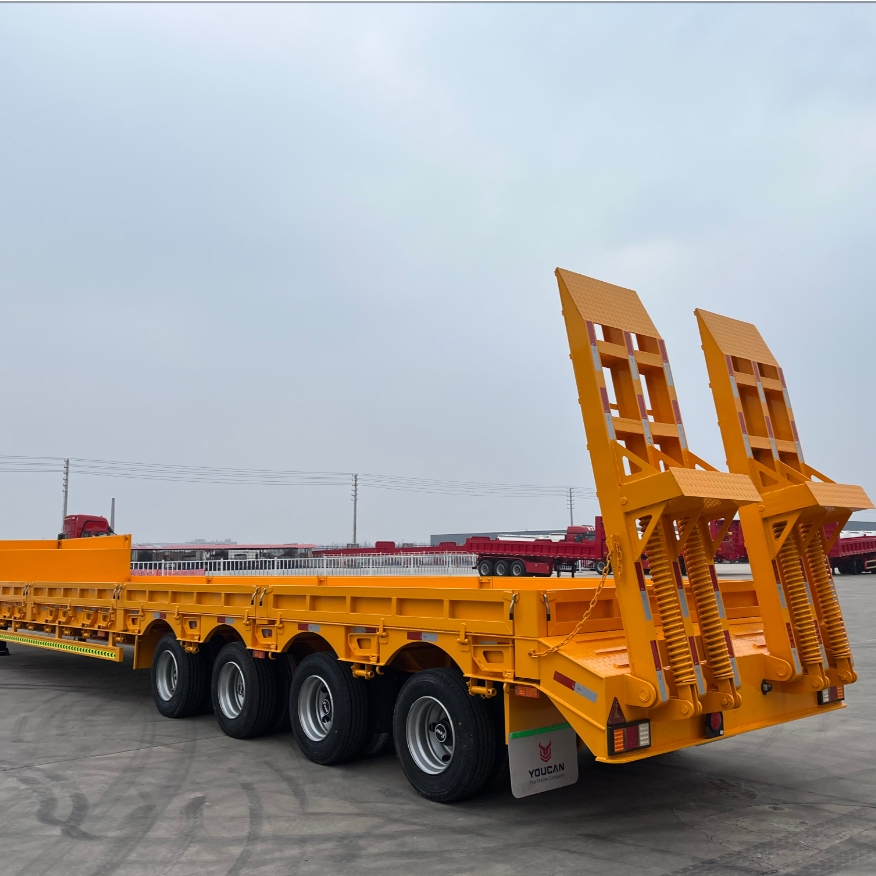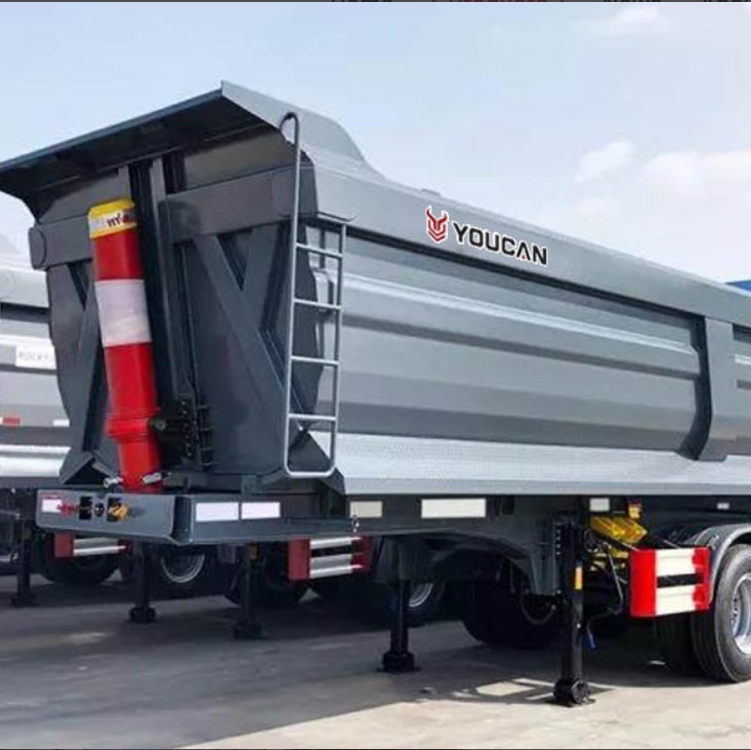Trailers for Loading and Transporting Containers
Global trade relies heavily on the efficient loading and transportation of shipping containers. Trailers play a crucial role in this process, as they are designed to safely and securely transport these containers from one location to another. Before the introduction of container transportation, the process of cargo handling and transportation was labor-intensive and inefficient. Goods had to be manually loaded onto ships, trains, or trucks and then unloaded at their destination one piece at a time, consuming a substantial amount of time and manpower. Transfers took days, and balancing the time cost against the economic burden was challenging.
The advent of shipping containers revolutionized the entire process. Their standardized size and design allowed for efficient storage, streamlining the transfer of goods across various modes of transportation, including ships, trains, and trucks. Today, the majority of global cargo transportation relies on the use of containers. The enhanced loading and unloading efficiency has significantly reduced both time and monetary costs. Furthermore, the integration of sea and land transport has accelerated the pace of global trade, advanced the process of globalization, and substantially improved both production and people's everyday lives.
As a professional trailer manufacturer,Youcan Trailer will discuss various types of trailers used for loading and transporting containers, each with its own unique features and applications.
1. Flatbed Trailers: Versatile and Adaptable
Flatbed trailers are the workhorses of the shipping industry due to their versatility in carrying numerous cargo types, including shipping containers. The flat, open deck without sides or a roof allows for hassle-free loading and unloading processes, and their ability to transport a wide array of freight makes them indispensable.
Key Features
Rugged open deck design
Load capacity suited for standard container sizes
Suitable for various types of cargo, including oversized and oddly-shaped items
Simplified loading and unloading process using cranes, forklifts, or even manual labor
Applications
Transporting containers between ports, railways, and distribution centers
Cargo transfer between trucks, ships, and trains
Carrying specialized cargo, such as construction materials and heavy machinery
Benefits
Flexibility in accommodating different cargo types
Adaptability for use in various transport sectors
Ease of loading and unloading
2. Chassis Trailers: Designed for Containers
Chassis trailers, also known as container chassis, are purpose-built for transporting shipping containers. The trailers' skeletal-frame structure is tailored to support various container sizes, streamlining the process and reducing the need for additional equipment.
Key Features
Specifically designed for shipping containers
Adjustable locking mechanisms for different container sizes
Lightweight and durable construction
Efficient and secure container loading and unloading
Applications
Container transportation between ports, rail terminals, and distribution centers
Trucking industry's primary choice for containerized cargo shipments
Benefits
Improved container handling efficiency
Enhanced safety and security for shipping containers
Simplified logistics and transport processes
3. Gooseneck Trailers: Stability and Height Accommodation
Gooseneck trailers are designed with a raised front section that connects to the towing vehicle. This feature allows for the transportation of taller containers while still meeting height restrictions. Furthermore, gooseneck trailers provide improved stability and maneuverability.
Key Features
Raised front section for height accommodation
Enhanced maneuverability and stability
Suitable for transporting taller containers
Applications
Container transportation in challenging terrain or congested road conditions
Hauling taller containers to comply with height restrictions
Benefits
Efficient handling of taller containers or oversized cargo
Improved handling when navigating difficult terrains or roadways
4. Extendable Trailers: Flexibility for Diverse Container Sizes
Extendable or telescopic chassis trailers are equipped with adjustable frames that can be lengthened or shortened based on a container's size. This adaptability makes them ideal for handling various sizes of containers without requiring multiple trailers.
Key Features
Adjustable frame length to accommodate different container sizes
Improved flexibility for cargo loads
Efficient transport for diverse container dimensions
Applications
Logistics companies managing cargo of varying dimensions
Transport of swap bodies, reefers, or other specialized containers
Benefits
Enhanced logistics efficiency by reducing the need for multiple trailers
Adaptable to the evolving demands of global shipping
5. Drop Frame Trailers: Meeting Height Requirements for Oversized Cargo
Drop frame trailers are designed with a lowered deck, providing additional height clearance when transporting taller or oversized containers. By accommodating unique cargo dimensions while complying with established regulations, drop frame trailers offer a specialized solution for transport challenges.
Key Features
Lowered deck for increased height clearance
Compliance with established height restrictions
Specialized design for heavy or oversized cargo
Applications
Transporting oversized containers or cargo
Hauling specialized equipment or machinery
Benefits
Legal transportation of oversized loads
Ensuring compliance with height restrictions
6. Side Loader Trailers: Efficient Loading and Unloading in Constrained Areas
Side loader trailers are specifically designed for loading and unloading containers from the side. Equipped with crane arms, these trailers offer a unique solution to container handling in tight spaces with limited overhead clearance.
Key Features
Crane arms for side loading and unloading operations
Optimized for container handling in tight spaces
Improved efficiency in loading and unloading processes
Applications
Container loading and unloading in space-constrained areas or limited overhead clearances
Situations where traditional cranes or loading equipment are not available
Benefits
Faster and more efficient loading and unloading processes
Enhanced adaptability for various operational scenarios
7. Roll-on Roll-off (RoRo) Trailers: Simplifying Container Loading
Roll-on roll-off (RoRo) trailers utilize a low-angled loading ramp for easy loading and unloading of containers. Their design simplifies the handling of containerized cargo without needing specialized equipment, making them a valuable asset in port operations with limited accessibility.
Key Features
Low-angled loading ramp for easy container handling
Streamlined cargo handling process
Facilitates rolling movements for container loading
Applications
Port operations with limited access to cranes or other loading equipment
Efficient handling of cargo during loading and unloading processes
Benefits
Simplified container loading and unloading process
Reduced reliance on specialized equipment
By delving deeper into the features, applications, and benefits of each trailer type, it becomes evident that a diverse range of trailers is available for loading and transporting shipping containers. Companies can optimize their operations and contribute to the safe and efficient movement of goods by selecting the most suitable trailer types
The Impact of Trailer Innovations on the Shipping Industry
The effective use of trailers for loading and transporting containers has brought about considerable advancements in the shipping industry. Faster loading and unloading times due to these specialized trailers have not only reduced transportation costs but also improved supply chain efficiency. This increased efficiency has propelled the expansion of global trade, driving economic growth and contributing to the overall interconnectedness of the world.
In conclusion, the diverse array of trailers available for loading and transporting shipping containers caters to the ever-evolving demands of global commerce. By selecting and utilizing the most suitable trailer type, companies can continue to ensure the safe, efficient, and legally compliant movement of goods across the world's supply chains, facilitating the growth of international trade.

 WhatsApp
WhatsApp
 sales@youcantrailer.com
sales@youcantrailer.com
 +8615203709888
+8615203709888


